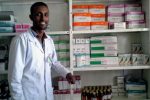The United States Agency for International Development (USAID), Management Sciences for Health, and the Ministry of Health of Ethiopia concluded USAID’s System for Improved Access to Pharmaceuticals and Services Activity.
The activity strengthened pharmaceutical management, supported the development of treatment guidelines and health facility standards, and reduced waste and corruption in the pharmaceutical sector. The result was improved access to quality pharmaceutical services that ensure the safe, appropriate and cost-effective use of medicines to achieve better health outcomes for Ethiopians.
In the past five years, the activity trained nearly 8,000 professionals, which resulted in improved motivation, higher retention and a more skilled workforce. It supported 77 health facilities across Ethiopia to implement transparent and accountable pharmaceutical transactions and services, and 128 health facilities to establish drug information services that resulted in a patient-centered approach.
To improve pharmacy data management, 208 health facilities established electronic dispensing tools and 558 public health facilities and 46 private hospitals now have drug and therapeutic committees.
This activity supported more than 1,000 health facilities providing antiretroviral therapy services to document, generate and report pharmaceutical data and information to support decision-making in the health system.
In addition, this activity helped establish automated medicine registration information systems and a health hotline center. Furthermore, the activity promoted adherence to treatment and medicine safety in priority health programs including malaria, HIV/AIDS, and maternal and child health.
Speaking at the event, USAID Ethiopia Representative BethAnne Moskov, “USAID‘s Systems for Improved Access to Pharmaceuticals activity has significantly improved pharmaceutical governance and service delivery, provided pharmacy data for decision making, and optimized the use of financial resources.”
Management Sciences for Health implemented the $17.6 million activity with funding from the President’s Malaria Initiative and the President’s Emergency Plan for AIDS Relief (PEPFAR). USAID will continue providing technical assistance to improve pharmaceutical supply and service systems to support the Ministry of Health’s plan to increase transparency, optimize resources and reduce improper use of medicines by patients.

